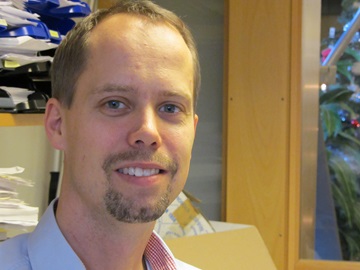Industrial remanufacturing is a growing, profitable industry. Computers, photocopiers, toner cartridges, car parts, trucks, furniture, large machines and many other things are being remanufactured. The technology is based on disassembling the product and replacing worn out parts, upgrading any software and then selling the product again. The product is just as good as, if not better than, when it was newly manufactured. But it is sold at a considerably lower price.
 Foto: Monica Westman“The remanufacturing industry turns over as much as the steel industry in Sweden today, but we almost never hear about it,” says Erik Sundin, assistant professor of Sustainable Production in the Division of Manufacturing Engineering.
Foto: Monica Westman“The remanufacturing industry turns over as much as the steel industry in Sweden today, but we almost never hear about it,” says Erik Sundin, assistant professor of Sustainable Production in the Division of Manufacturing Engineering.
“The aim is to get more companies and branches to invest in remanufacturing and also to increase competitiveness across the sector. Our work will then provide the basis for new applications to Horizon 2020,” says Professor Sundin.
In this field, Europe is lagging behind America and China, who have gone considerably further with their efforts in remanufacturing and reduced resource wastage.
Both research projects concern how, with the aid of better information management, we can construct and manufacture products such that they are easier to remanufacture and how remanufacturing itself can become more efficient and ecological.
Remanufacturing and ecodesign are also present in courses at LiU; two popular examples are the courses in Sustainable Manufacturing (TMPS31) and Resource Efficient Products (TKMJ29).
2014-11-06
 Foto: Monica Westman“The remanufacturing industry turns over as much as the steel industry in Sweden today, but we almost never hear about it,” says Erik Sundin, assistant professor of Sustainable Production in the Division of Manufacturing Engineering.
Foto: Monica Westman“The remanufacturing industry turns over as much as the steel industry in Sweden today, but we almost never hear about it,” says Erik Sundin, assistant professor of Sustainable Production in the Division of Manufacturing Engineering.
Best practicies for Europe
Erik SundinAs part of the EU Horizon 2020 scheme he will now develop “best practices” for Europe, working with the British consultants Oakdene Hollins and colleagues at universities in Germany, Holland, Great Britain, France and Finland. They will gather together all the best conceivable solutions from construction, business modelling and remanufacturing technology.“The aim is to get more companies and branches to invest in remanufacturing and also to increase competitiveness across the sector. Our work will then provide the basis for new applications to Horizon 2020,” says Professor Sundin.
In this field, Europe is lagging behind America and China, who have gone considerably further with their efforts in remanufacturing and reduced resource wastage.
Vinnova-financed
Professor Sundin and his colleague, Mattias Lindahl from the Division for Environmental Technology and Management, are also heading up two Vinnova-financed projects around remanufacturing. The project has funding of around SEK 10 million over three years. Researchers at Chalmers are also taking part, as are a number of companies who work with remanufacturing: TetraPak (remanufacturing of filling machines), Toyota Material Handling (remanufacturing of trucks) UBD Cleantech (car parts), Inrego (computers), LTB Jobb (furniture) and Qlean Scandinavia, which offers efficient and environmentally friendly cleaning technology for remanufacturing.Both research projects concern how, with the aid of better information management, we can construct and manufacture products such that they are easier to remanufacture and how remanufacturing itself can become more efficient and ecological.
Remanufacturing and ecodesign are also present in courses at LiU; two popular examples are the courses in Sustainable Manufacturing (TMPS31) and Resource Efficient Products (TKMJ29).
2014-11-06

